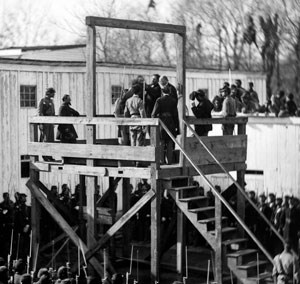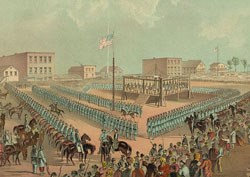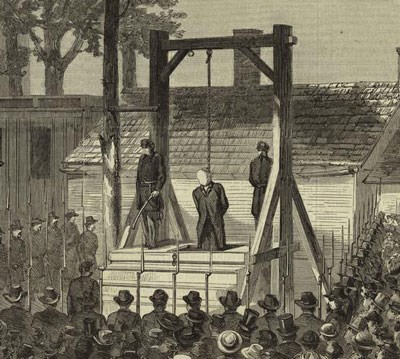
Library of Congress Because of the massive newspaper coverage of the Wirz Tribunal, and the lack of trials against major Confederate leaders such as Robert E. Lee, it appeared to average Americans – both north and south – that Wirz was the only person tried, convicted, or executed after the war. This assumption as frequently been cited as "proof" that the government was out for vengeance against Wirz alone. While the trial of Henry Wirz was by far the most famous of the military tribunals at the end of the Civil War, it was not the only one. In fact, there were nearly 1,000 military tribunals in which Confederates, both regulars and guerrillas, were charged with various violations of the laws of war – mostly related to the treatment of prisoners of war. Some of these trials even led to acquittals. For example, the camp commander at Salisbury Prison, Major John Gee, was arrested in the fall of 1865 and charged with similar crimes as Wirz. Unlike Wirz, Gee was unanimously acquitted in the spring of 1866. After the war, General Grant actually prevented the tribunal of another of Salisbury's commanders, Bradley T. Johnson, who faced charges of negligence at the prison and for burning Chambersburg, Pennsylvania in the summer of 1864. Even among those convicted, Wirz did not stand alone for the atrocities of Andersonville. James Duncan, who worked in the quartermaster's office at Andersonville, was arrested and convicted of manslaughter by a military tribunal for his role in intentionally withholding rations from prisoners. He was sentenced to hard labor at Fort Pulaski, where he escaped a year later. 
Library of Congress In addition to post-war military tribunals by the US Army, the Confederate military routinely punished individual guards who committed violations against prisoners. For example, several guards at Andersonville were court-martialed by their own superior officers and placed in the stocks or given the ball and chain right alongside the Union prisoners. Perhaps the most enduring claim about Henry Wirz is that he was the only person executed by the Federal government in connection with the Civil War. But this was not the case. For example, more than three hundred Sioux Indians were convicted and sentenced to death by military tribunal in 1862. President Lincoln commuted the sentence of most, but in December 1862 thirty eight were hanged by military tribunal in what remains the largest mass execution in American history. Although his execution is the most famous of the Civil War, Wirz was certainly not the only Confederate to be executed. Perhaps most prominent of these other Confederates to be executed was Champ Ferguson, who was convicted in the fall of 1865 for the execution of at least 53 captured Union soldiers, although Ferguson claimed the total was higher. In another high-profile case, Confederate officer Robert Kennedy was executed by a military tribunal for planting explosives around New York City, including heavily trafficked locations like P.T. Barnum's Museum. 
Harper's Weekly There were further military tribunals against Confederates planned in the spring of 1866. For example, a board of inquiry found that there was sufficient evidence to charge General George Pickett, of Gettysburg fame, for signing off on the execution of twenty two North Carolinians serving in the Union Army who were captured at New Bern, NC in February 1864. However, thanks to the intercession of his old West Point classmate Ulysses Grant and President Johnson's April 1866 proclamation that the rebellion was over, Pickett was never arrested and charged by a military tribunal. Johnson's 1866 proclamation specifically banned military tribunals in peacetime, and effectively put a stop to any further arrests and charges like those brought against Henry Wirz. Military tribunals conducted by victorious armies are commonplace after wars, and are usually fraught with controversy. The military tribunals held at the end of the Civil War have much in common with the trials against Nazi officials at Nuremburg and even the military tribunals at Guantamo Bay. For those doing the prosecuting, they are simply enforcing the laws of war. However, for those facing prosecution and their supporters, military tribunals appear as a miscarriage of justice by a vengeful victor. Ultimately, the cessation of tribunals, such as what happened after Johnson's 1866 proclamation, is an important step in the healing and reconciliation process after conflict. To learn more about the military prison career of Henry Wirz, click here. |
Last updated: April 14, 2015
